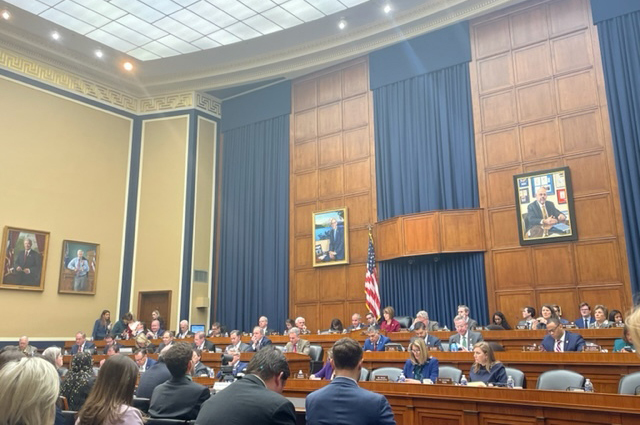WASHINGTON — Members of Congress grappled with the intersection between energy and national and economic security on Tuesday along with the environmental impacts of energy expansion.
In the first House Energy and Commerce Committee hearing of the 118th Congress, Republicans called for unleashing all American energy sources, including fossil fuels. Democrats meanwhile pushed back, insisting the focus should be on renewable energy.
Opening the hearing, Chair Cathy McMorris Rodgers (R-Wash.), whom multiple members pointed out is the first female chair of the committee, summed up the Republican position.
“Our energy solutions are climate solutions,” she said. She touted bills that passed the House last week to prohibit the sale of oil from the Strategic Petroleum Reserve and expand federal land available for oil and gas production as the start of what she calls “a robust agenda to restore American energy dominance.”
Rodgers also called for the government to not pick “winners and losers,” and allow for growth in all forms of energy.
Ranking Member Frank Pallone (D-N.J.) tepidly supported that position but said the focus needs to be on renewable energies.
“The bottom line is we’re going to be left behind if we don’t move toward renewables,” he said.
Pallone touted investments the last Congress passed, like the Inflation Reduction Act (IRA), which allocated billions of dollars for clean energy projects. Dr. Ana Unruh Cohen, former majority staff director for the now-defunct House Select Committee on the Climate Crisis, also reflected on the IRA.
She touted the tens of billions in clean energy projects that have been announced since the IRA’s passage and said that figure will only grow in the coming years. But Congress still has more work to do, she said. “The need for the clean energy transition is a clear and growing urgency.”
Paul Dabbar, former under secretary of energy for science under former President Donald Trump, also reflected on past achievements.
He said under the Trump administration, the U.S. became the dominant country in energy. However, he’s concerned the U.S. has lost its path.
Dabbar called for Congress to require agencies like the Department of Interior, Environmental Protection Agency, and Federal Energy Regulatory Commission to approve projects for all energy types.
Meanwhile Donna Jackson, director of membership development at the National Center for Public Policy’s Project 21, highlighted the impact the rise in energy prices is having on low-income and middle-class individuals. She specifically mentioned its effects on Black families, who already have lower median income levels.
“They don’t have that much extra money to be able to spend on unaffordable energy,” she said. “It disproportionately impacts their standard of living.”
She called for the market to decide on how to expand energy, but also that policymakers should make sure the communities she mentioned aren’t “afterthoughts” when they debate how to proceed on energy.
Robert McNally, president of the Rapidan Energy Group, said he expects boom and bust cycles in the oil markets to continue to impact consumers. To alleviate those pains, he also called for an all of the above approach.
But when Rep. Dianne DeGette (D-Colo.) questioned Cohen about whether expanding oil and gas production would limit the impacts of price shocks and decrease dependency on other nations, Cohen responded no.
“Our goal should be energy security, which means relying on clean energy produced here in the United States,” Cohen said.
As war in Ukraine rages on and Russian President Vladimir Putin continues to limit Europe’s oil supply, witnesses said the importance of making America energy independent is clear. McNally had a simple piece of advice for the committee on how to avoid Europe’s fate.
“Don’t become dependent on Russia or any other adversary for your critical supplies of energy,” he said.

